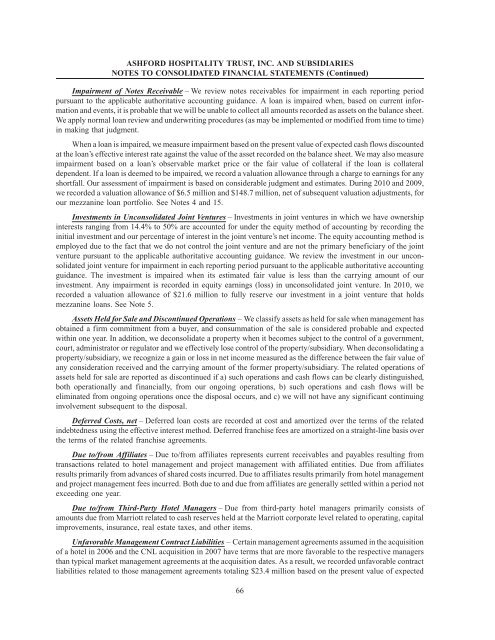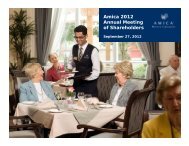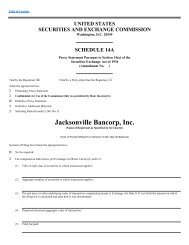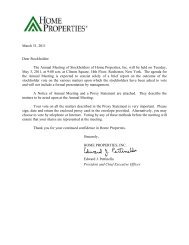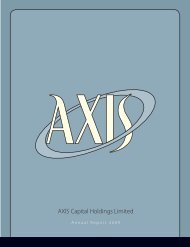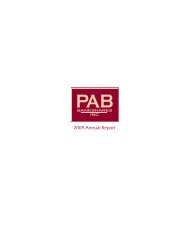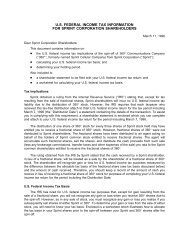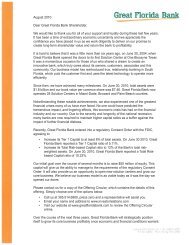2010 AnnuAl RePoRT - SNL Financial
2010 AnnuAl RePoRT - SNL Financial
2010 AnnuAl RePoRT - SNL Financial
You also want an ePaper? Increase the reach of your titles
YUMPU automatically turns print PDFs into web optimized ePapers that Google loves.
ASHFORD HOSPITALITY TRUST, INC. AND SUBSIDIARIES<br />
NOTES TO CONSOLIDATED FINANCIAL STATEMENTS (Continued)<br />
Impairment of Notes Receivable – We review notes receivables for impairment in each reporting period<br />
pursuant to the applicable authoritative accounting guidance. A loan is impaired when, based on current information<br />
and events, it is probable that we will be unable to collect all amounts recorded as assets on the balance sheet.<br />
We apply normal loan review and underwriting procedures (as may be implemented or modified from time to time)<br />
in making that judgment.<br />
When a loan is impaired, we measure impairment based on the present value of expected cash flows discounted<br />
at the loan’s effective interest rate against the value of the asset recorded on the balance sheet. We may also measure<br />
impairment based on a loan’s observable market price or the fair value of collateral if the loan is collateral<br />
dependent. If a loan is deemed to be impaired, we record a valuation allowance through a charge to earnings for any<br />
shortfall. Our assessment of impairment is based on considerable judgment and estimates. During <strong>2010</strong> and 2009,<br />
we recorded a valuation allowance of $6.5 million and $148.7 million, net of subsequent valuation adjustments, for<br />
our mezzanine loan portfolio. See Notes 4 and 15.<br />
Investments in Unconsolidated Joint Ventures – Investments in joint ventures in which we have ownership<br />
interests ranging from 14.4% to 50% are accounted for under the equity method of accounting by recording the<br />
initial investment and our percentage of interest in the joint venture’s net income. The equity accounting method is<br />
employed due to the fact that we do not control the joint venture and are not the primary beneficiary of the joint<br />
venture pursuant to the applicable authoritative accounting guidance. We review the investment in our unconsolidated<br />
joint venture for impairment in each reporting period pursuant to the applicable authoritative accounting<br />
guidance. The investment is impaired when its estimated fair value is less than the carrying amount of our<br />
investment. Any impairment is recorded in equity earnings (loss) in unconsolidated joint venture. In <strong>2010</strong>, we<br />
recorded a valuation allowance of $21.6 million to fully reserve our investment in a joint venture that holds<br />
mezzanine loans. See Note 5.<br />
Assets Held for Sale and Discontinued Operations – We classify assets as held for sale when management has<br />
obtained a firm commitment from a buyer, and consummation of the sale is considered probable and expected<br />
within one year. In addition, we deconsolidate a property when it becomes subject to the control of a government,<br />
court, administrator or regulator and we effectively lose control of the property/subsidiary. When deconsolidating a<br />
property/subsidiary, we recognize a gain or loss in net income measured as the difference between the fair value of<br />
any consideration received and the carrying amount of the former property/subsidiary. The related operations of<br />
assets held for sale are reported as discontinued if a) such operations and cash flows can be clearly distinguished,<br />
both operationally and financially, from our ongoing operations, b) such operations and cash flows will be<br />
eliminated from ongoing operations once the disposal occurs, and c) we will not have any significant continuing<br />
involvement subsequent to the disposal.<br />
Deferred Costs, net – Deferred loan costs are recorded at cost and amortized over the terms of the related<br />
indebtedness using the effective interest method. Deferred franchise fees are amortized on a straight-line basis over<br />
the terms of the related franchise agreements.<br />
Due to/from Affiliates – Due to/from affiliates represents current receivables and payables resulting from<br />
transactions related to hotel management and project management with affiliated entities. Due from affiliates<br />
results primarily from advances of shared costs incurred. Due to affiliates results primarily from hotel management<br />
and project management fees incurred. Both due to and due from affiliates are generally settled within a period not<br />
exceeding one year.<br />
Due to/from Third-Party Hotel Managers – Due from third-party hotel managers primarily consists of<br />
amounts due from Marriott related to cash reserves held at the Marriott corporate level related to operating, capital<br />
improvements, insurance, real estate taxes, and other items.<br />
Unfavorable Management Contract Liabilities – Certain management agreements assumed in the acquisition<br />
of a hotel in 2006 and the CNL acquisition in 2007 have terms that are more favorable to the respective managers<br />
than typical market management agreements at the acquisition dates. As a result, we recorded unfavorable contract<br />
liabilities related to those management agreements totaling $23.4 million based on the present value of expected<br />
66



